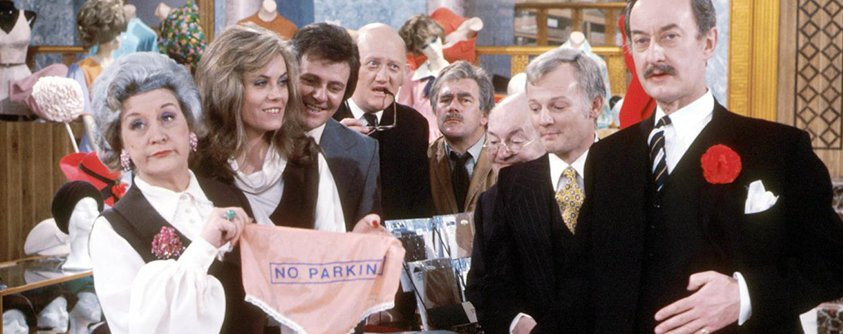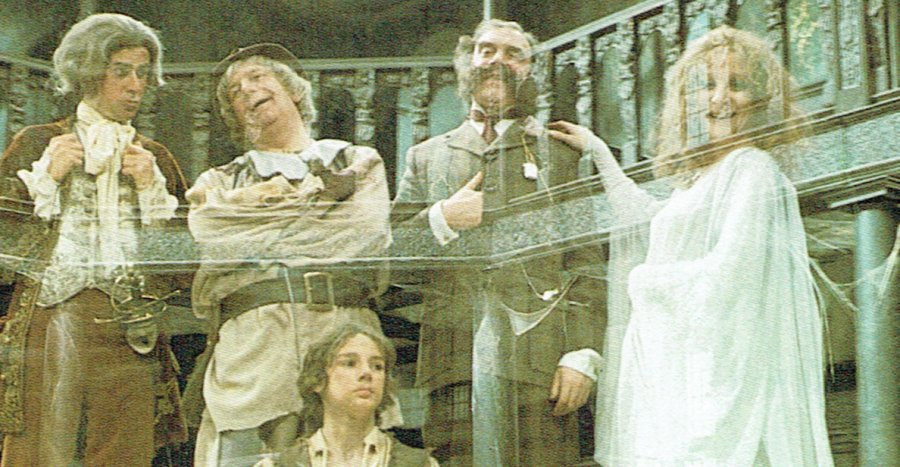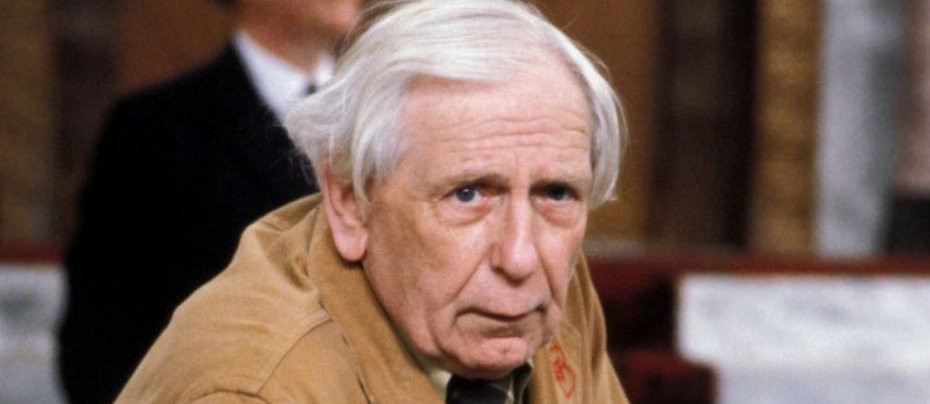
Arthur English
A humble man, as kind in spirit as he was funny on stage
Arthur English biography by Brian Slade
The late James Beck was known as the ultimate spiv character after his time in Dad’s Army as Private Walker, the man who knew how to get everything for the right price and a level of discretion. But one man had already cornered that market in front of the toughest of crowds, the famous – nee infamous – Windmill Theatre and subsequently became one of the most popular character actors on television, even turning down an offer from Noel Coward in the process. That man was Aldershot’s finest, Arthur English.
Arthur English was born in Aldershot in 1919. There was no theatrical dynasty behind him – his father had left school at 11 years old and became involved in Cheltenham races and the horseman world, although by the time Arthur came along, Walter English was doing horse and cart deliveries for the local Junior Army and Navy Stores. He had been left an inheritance by his first wife of around £2000, but as Arthur recalled, ‘he drank the lot!’ and so at the time of Arthur’s birth, family income was supplemented by his mother, who earned her crust cleaning.
The Army came calling 11 weeks into the Second World War, Arthur reaching the rank of sergeant during his years of service. He narrowly avoided death, having escaped his crew’s tank just seconds before it exploded under enemy fire near the Rhine, where he and his colleagues submerged themselves to avoid following gunfire aimed at them.
In 1941, Arthur married his childhood sweetheart, Ivy, to whom he had been engaged since he was 18. Ivy became a vital part in his success story. He auditioned at the Windmill Theatre with a comedy partner, Johnny Carol in 1948 but failed. Unbeknown to him though, his brother had written to the Windmill’s renowned impresario Vivian Van Damm and asked him to audition Arthur’s solo act, sending him a picture of Arthur in a spiv outfit. When Arthur first performed, he didn’t even know what a spiv was, but after being challenged on it by a punter who suggested that he was one, he promptly equipped himself with all the necessary tools. Ivy created an over-sized yellow tie to complete the act, under Arthur’s protestations, but he trusted her judgement and it was his outfit that got him the audition. Even then, his success owed much to Ivy as he weighed up the insecurity of a daily rate offer that could end at any minute against a smaller but more secure wage painting. She convinced him to take a punt on Van Damm’s offer, and Arthur’s professional career was underway.
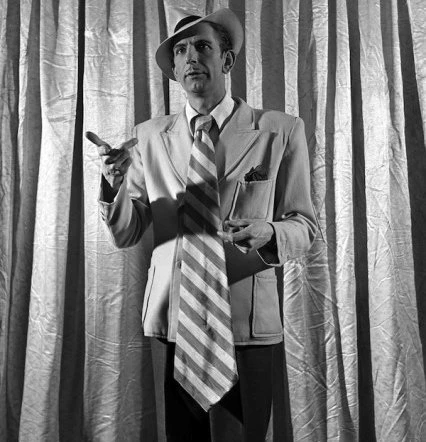
The Windmill may have been a starting ground for many comedy performers over the years, but Arthur denied that it taught budding comedians nothing. Given that a great many of the patrons were there solely to see the nudity, Arthur said it taught him to die with composure. Those who wished to be in the audience and were not there for the comedians would inevitably be keeping a low profile behind newspapers, but Arthur was quite content to use those particular patrons as subjects of his jokes. Of one pairing that he said played cards while he was on, he joked, ‘The other day only one of them came in. On his own. He didn’t have anyone to play with…so he sat there and played with himself…’
Unlikely though it may seem, the great Noel Coward took a seat for several performances before asking Arthur to play a spiv waiter in his upcoming show Ace of Clubs. Arthur declined. As Arthur’s career took him into radio, he began to get a reputation as a quick-thinking stand-up and eventually Vivian Van Damm put himself forward as his agent. A clash with the BBC over billing, to whom Van Damm would not bow, led to Arthur parting ways with him and taking Chesney Allen as his agent as his career began to blossom.
Arthur did all the radio classics - Look Who’s Here, Variety Bandbox, Workers’ Playtime – and he was a success at each. He even met the future Queen at the 1951 Royal Variety Performance, when she commented on his kipper tie in the after-show line-up! Despite this, the gradual closing of the Variety Halls led to Arthur deciding to quit the business in the later 1950s after being offered a job as a paint salesman, while setting his wife up with a drapery business in Aldershot. The spiv character was no more. But if the Windmill was the starting ground for some performers, others earned their stripes as redcoats at Butlins, and no sooner had Arthur been offered his salesman job than Billy Butlin came calling. From there though, the work didn’t follow for some time and when it did, he had to accept he was no longer top of the bill, and it wasn’t until 1974 that he found his feet on television.
His first breakthrough role was in Copper’s End in 1969, having done the rounds in sketches for the likes of Leslie Crowther, Frankie Howerd and guest roles in standard CV shows at the time like Dixon of Dock Green and Dad’s Army. Arthur’s appearance in Copper’s End had no lines, just a requirement to climb some cellar stairs with a crate of beer. However, the laughter induced from it convinced the producer to add more scenes in future episodes and not that long afterwards he was talking with Yorkshire television about the part of Slugger in Follyfoot.
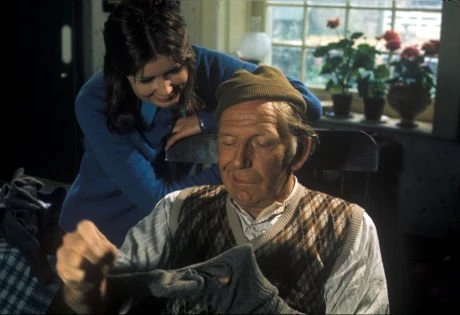
Ironically, Slugger had been written as a former jockey and boxer working for a riding family. However, despite his father’s experience in the riding business, Arthur was terrified of horses. His first take saw him run for the hills when the horse arrived, and a mistimed cue of his next scene saw him leave a house too early and instead of looking at the hind legs of four runaway horses, he was standing in the line of four charging straight at him. Arthur’s reaction – ‘Don’t bother, I’ll make the tea!’ as he ducked back inside – made the writers realise that his comic skills would allow them to change the character, which they did to great effect.
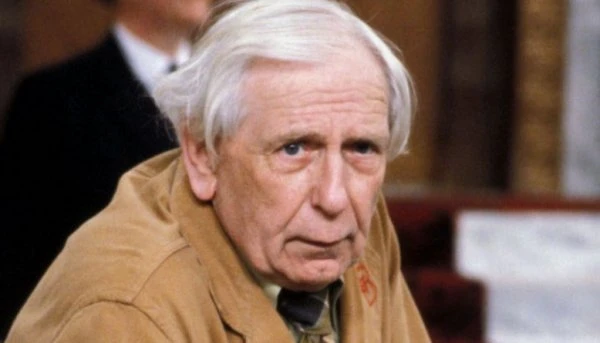
Even greater success awaited Arthur when comedy producer and writer extraordinaire David Croft came calling. It’s well known that Croft had a habit of noting performers that he worked with and then calling on them years later when a suitable role arose. Arthur had appeared in Hugh and I in 1962, but in 1976 Croft found himself looking for a new maintenance man on the floors of Grace Brothers, Larry Martyn having left his role of Mr Mash. The role of Mr Harman was an instant success and his one-episode trial turned into a permanent fixture through to the show’s demise in 1985. It also helped pull Arthur from a grief-stricken wilderness after the death of his beloved wife in 1975 which sent him into a spiral of drinking. Arthur never once considered working on Are You Being Served? to actually be work. The atmosphere and camaraderie were a stable force in his life that he loved, and his character’s success was in no small part down to his own cheeky charm.
His grief was also helped by a new relationship with a new lady in his life, eventually marrying dancer Teresa Mann. John Inman had kindly urged him to join him in panto to try and keep his mind occupied during the festive season, and it was then that Arthur decided to pick himself up and get back on with his life. He had been a one-woman man with Ivy, but he had grieved long enough, and he and Teresa married in August 1977.
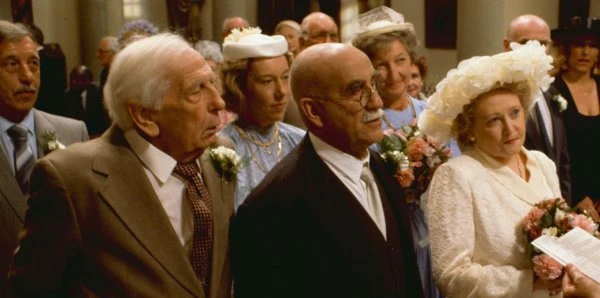
Arthur’s remaining screen role that most will recognise him as was Alf Garnett’s drinking buddy, appropriately named Arthur, in In Sickness and in Health. By 1985, Garnett’s humour was becoming a challenge to values, Alf now having a gay, black carer in his older years to challenge his bigoted views. With the loss of his ‘silly old moo’ after the death of Dandy Nichols, Arthur became a sounding board as an often-tipsy Alf aired his life’s challenges.
Arthur English died in a care home in 1995. After bursting on the stage as a headline stand-up comedian, he had to get used to being part of the cast rather than headlining it. But the industry never forgot his status. Warren Mitchell said that he could learn everything about comedy from Arthur, and in his earlier days, Vivian Van Damm predicted that Arthur would reach the top, in no small part to him being the best behaved of the many artists to tread the Windmill boards. A humble man, as kind in spirit as he was funny on stage, he remains one of television’s comforting faces that brings a smile every time he is seen in screen.
Published on March 22nd, 2023. Written by Brian Slade for Television Heaven.




